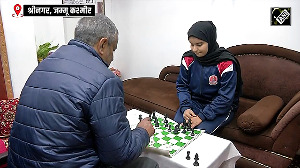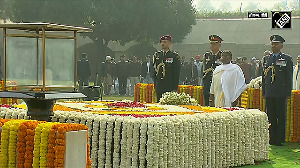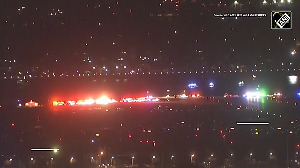The acts of Ajmal Kasab, the lone terrorist arrested during the terror siege in Mumbai, and the other accused in the 26/11 attack amounted to 'waging a war against India', which is punishable by the death penalty or life imprisonment, the prosecution argued in a trial court on Wednesday.
"By firing at people indiscriminately in Mumbai, Kasab and the other conspirators wanted to destabilise the government and break the political and economic order of the country," Special Public Prosecutor Ujjwal Nikam said in his arguments that began on Tuesday in the high-security court in Mumbai.
"Terror acts amount to waging war against the nation because some nations chose to use this as weapon to commit proxy war on others," Nikam submitted. He argued that the definition of the offence of waging war against the nation, under Section 121 of the Indian Penal Code, includes persons of all nationalities and said this applies to Kasab also, who had allegedly indulged in terror acts.
Nikam said the other two accused, Faheem Ansari and Sabauddin Ahmed, who have been charged with preparing maps of 26/11 targets, are also liable to be held guilty of 'waging war against India'.
He referred to Kasab's confession, in which he had said that the 26/11 attackers were asked by conspirators at a training camp in Pakistan to commit terror acts in Mumbai, to "bring pressure on the Indian government to liberate Kashmir".
The confession, which was later retracted by Kasab, had also mentioned that Mumbai was being targeted because it is the financial hub of India.
Incidentally, when Nikam was making his argument, Kasab was caught sleeping in the dock and Judge M L Tahilyani had to reprimand him.
Harping on his argument of 'waging war against the nation', Nikam further said that Kasab and others had been instructed by conspirators to kill American, Israeli and British nationals, because they felt that people of these countries had committed atrocities against Muslims.
He referred to intercepted telephonic talks between attackers and their Pakistani handlers during terror attacks, in which the former were instructed to kill Israeli nationals to 'spoil friendly relations between India and Israel'.
In another development, Nikam said Kasab's stand at the end of the trial, that he had come to India as a Pakistani tourist and was in police custody on the day of 26/11 strike, was "a pack of lies, false defence and an after-thought".
He wondered why Kasab had not cross-examined the three police officers who had deposed that they had caught him alive at Girgaum Chowpatty on the night of 26/11 when he was trying to escape in a car along with another terrorist.
As an after-thought, he had taken this defence at a much later stage, when the court was recording his statement after closing evidence, the prosecutor said. Kasab's claim that he was in police custody on 26/11 was also falsified by his photographs placed as evidence, he said. A cameraman had shot Kasab's photographs at the Chhatrapti Shivaji Terminus and at a nearby foot over-bridge, he said.








 © 2025
© 2025